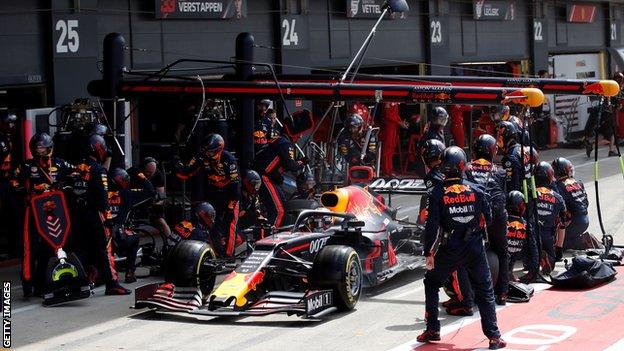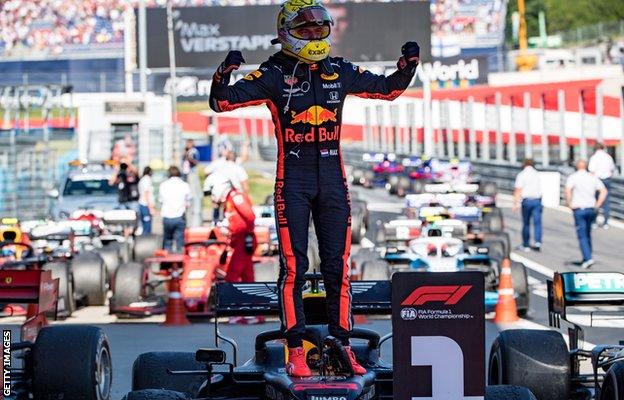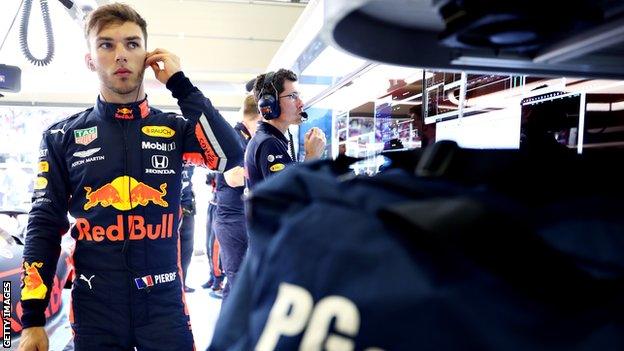Red Bull & Max Verstappen: Christian Horner says car's potential has been unlocked
- Published
- comments

Max Verstappen is third in the World Championship
Red Bull have made so much progress with their car in such a short space of time that its cornering abilities at the British Grand Prix overwhelmed the programming of Honda's engine.
In qualifying at Silverstone, Max Verstappen mashed the throttle so hard and fast, thanks to the confidence created by the grip from the car's revised aerodynamics, that the engine electronics could not cope.
The result was a small delay in power application every time he pressed the accelerator - and yet, even so, Verstappen was just 0.183 seconds off Mercedes driver Valtteri Bottas' pole-position time.
This came two weeks after Verstappen's sensational victory in the Austrian Grand Prix, and provided further evidence that Red Bull might - just might - be poised to provide consistent opposition to Mercedes over the second half of the season.
Verstappen never had the chance to show his true race pace at Silverstone because he spent most of the grand prix bottled up behind one Ferrari or another, before Sebastian Vettel rammed into the back of him at Vale and consigned the Dutchman to a fifth-place finish.
But the way he was climbing all over the back of Charles Leclerc in the opening third of the race - with the two Mercedes not far up the road - demonstrated that there was serious speed in the car.
And given that the Honda, for all the notable gains it made in performance over the winter, is still the least powerful engine in Formula 1, and Silverstone one of the tracks where performance is most engine-dependent, it bodes well for Red Bull over the coming races.
Before next weekend's German Grand Prix, with Hungary to follow a week later, team boss Christian Horner says: "We've definitely unlocked some potential in the car.
"We have confidence going to Hockenheim given the performance at Silverstone. Hungary is a track we have always performed well at, so that's encouraging for us, and certainly for a circuit like Hockenheim."
Verstappen riding high

Verstappen celebrates winning the Austrian Grand Prix on 30 June
Verstappen has been one of the standout performers of the season. Thanks to his driving, and Red Bull's aggressive strategies, he managed to beat both Ferraris in Australia and Spain, and split them in China and France. And he would have finished second in Monaco had he not been penalised for pushing Bottas into the pit wall.
And then came Austria, where after the introduction of an aerodynamic upgrade aimed at fixing some of the car's early-season weaknesses, he qualified third, was promoted to the front row after a penalty for Lewis Hamilton, slipped to seventh on the first lap after a terrible start, and came through to pass Leclerc for victory two laps from the end in one of the drives of the season.
Horner has the highest praise for the level Verstappen is operating at.
"If you look at pure form, Max as a driver at the moment is in the form of his life, and is in arguably the best form on the grid - if you look at how much he gets out of a car in qualifying, at the start of a race, in a grand prix, managing the tyres, race-craft," he says.
How Verstappen left the crashes behind
For Verstappen, it has been a huge turnaround from the troubled driver who had incidents of one kind or another for six races in a row at the start of last season.
Horner believes the events of Monaco in 2018 - the last of those races - were the wake-up call that convinced Verstappen he needed to make changes.
He crashed in final practice and was unable to take part in qualifying, and had to watch team-mate Daniel Ricciardo take pole and go on to win the race.
"He had a tough start to last year, a few mistakes and I think, after Monaco, that really hurt him," Horner says.
"He had a car quick enough to win the race, he'd been 0.2secs up in every session and then to crash just before qualifying and lose the opportunity to compete for victory - and then see your team-mate deliver what potentially he may have been able to do - I think that was a defining moment for him. From the very next race in Montreal, he was a different operator."
Horner says that Verstappen - who can at times come across as blunt and simplistic, someone who just gets in the car and drives the wheels off it - is misunderstood.
"He's also a deep thinker," Horner adds. "He knows a huge amount about what's going on, not just in Formula 1 but in motorsport generally. He's a huge fan of the sport. If he's not racing at a grand prix, he's racing online on sim races.
"He came into the sport so young, 16 when he [started car] racing. It's only natural that as you gain more experience and as you grow older, your outlook, your perspective, changes."
Praise for the new generation
Horner, like many others, has enjoyed the battles between Verstappen and Leclerc in the past two races, and he sees a bright future for the sport with the latest generation of drivers.
"It's great for F1," he says. "You can never stop time and it's clear to see some great talent emerging in Formula 1 at the moment - with Max having established himself, Leclerc is doing a great job.
"Lando Norris has done a good job in a McLaren this year. I'm sure George Russell is right there but the equipment [at Williams] doesn't allow him to show that.
"F1 can be excited about the potential of those guys. But it's also great to see the young guns go up against the established guys as well - the Hamiltons and the Vettels. We have a great period in time where you just hope equipment allows those guys to race hard and competitively with each other."
There are also words of encouragement for Anglo-Thai Alexander Albon, who is in his debut season with the Red Bull junior team Toro Rosso.
"He's raw and he needs time. But he's genuinely doing a pretty decent job in his rookie season," Horner says.
Understanding for Gasly
Verstappen's team-mate Pierre Gasly, meanwhile, has had a rough time. Until a strong race at Silverstone, the Frenchman, in only his second year in F1, had lagged a long way behind Verstappen.
This had led to speculation about 23-year-old Gasly's Red Bull future. However, Horner says the team are prepared to give him time to improve, and that saying he has not been performing at an acceptable level is "a little harsh".
"He has been thrown into the seat earlier than we would have planned," Horner adds. "He had a couple of accidents pre-season that knocked his confidence. Compounding that, he's got arguably the toughest team-mate in the world.
"For sure, he's under-delivered against his own potential in the first seven, eight races of the year. But we've known him a long time, we know what his potential is - and that's why we're giving him all the backing we possibly can to try to help him turn the corner."
There have even been rumours that German Vettel, who has been having a difficult time at Ferrari over the past 12 months, could find his way back to Red Bull next year.
But Horner says: "Sebastian is under contract, I believe until the end of next year at least. There has been no discussion about him coming back. We're very happy with the job Max is doing.
"I think the top three teams will remain status quo at least until the end of 2020."

Christian Horner says Red Bull will be giving Pierre Gasly time to improve
Why the slow start for Red Bull?
Red Bull ended last season on a high. Verstappen was the fastest driver in two of the final three races. He took a dominant victory in Mexico and would have won in Brazil as well, had he not tangled with a back marker while lapping him.
But this season did not start so well, despite the team's obvious satisfaction with the gains made over the winter by new engine partner Honda.
Horner says there were a number of reasons for their slight step backwards following their switch from Renault engines, particularly the new front-wing rules introduced for this season in an attempt to improve racing.
"First of all, there was a significant change in the regulations in two fundamental areas on the chassis side, where the front wing was quite a big hit for us," Horner explains.
"We had optimised the previous regulations by the point of 2018. We had a very, very strong car, and I think the front-wing change did hurt us probably more than most.
"A stiffer, different construction of tyre probably compounded things as well.
"2019 was always going to be a transitionary year from a partnership point of view with the engine. I would say, in the early races, perhaps the engine delivered more and we delivered less than we thought on the chassis.
"The net result was about where we thought we would be - but through different means.
"As we've understood the regulation change better and better, and managed to optimise the car more and more, the performance has been getting stronger and stronger."
Red Bull follow a different aerodynamic philosophy from Mercedes and Horner says his team's design chief Adrian Newey believes the front-wing change was a bigger hit for them than for the world champions.
"But I think the guys are getting a very good handle on that now and you can see, race by race, the car is improving," he adds.
The tyre change has also removed an advantage Red Bull created in 2018.
Horner says: "We were very good on the tyre last year in terms of degradation, managing degradation and so on. Now the tyres are more robust - they're not as fragile as perhaps they were - any benefit we had in that area has been negated."
But the signs are that Red Bull are moving up. Their average qualifying deficit to Mercedes over the season is 0.602secs. In the past two races, it is only 0.180secs.
More aerodynamic developments are coming, while on the engine front the lag issue should be resolved for Germany. There is also a third performance upgrade coming at some point.
Horner says: "We have had two third places and a victory in the first nine races. We should have finished second in Monaco and pushed Lewis all the way there.
"It has been a reasonable first half of the year, and with the momentum we're building I would expect us to have a more competitive second half of the year."
